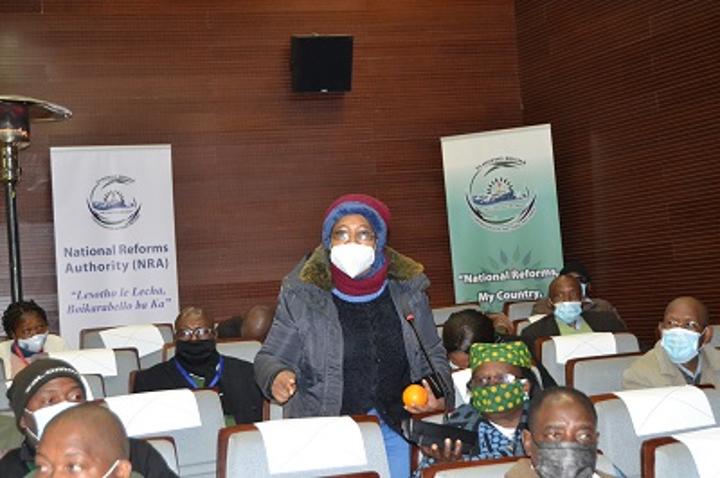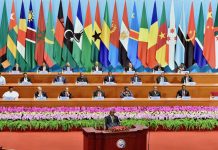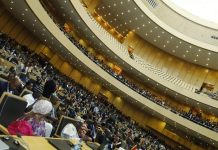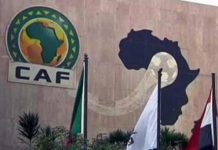Africa-Press – Lesotho. The families of the victims of human rights violations and atrocities have taken a swipe at the government, accusing it of its involvement in the ongoing National Stakeholders
Consultations Forum at ‘Manthabiseng Convention Centre during its official opening ceremony on Wednesday this week. Titled, “Towards Securing Sustainable Peace,
Political Stability, National Unity, Reconciliation and Social Justice in Lesotho” the forum is a preparatory exercise for the establishment of the peace architecture.
The commotion broke when they stood to charge at government, accusing it for tabling the controversial National Peace and Unity Bill, 2021. One of the victims
family members, ‘Mamphanya Mahao said the government has got no business in attending the stakeholders forum as it is seized with the National Peace and
Unity Bill. The wife of the slain former Lesotho Defence Force (LDF) Commander Lieutenant Maaparankoe Mahao said the government should not be part of this exercise.
‘Mabula Khetheng alleged that the victims were side-lined in the forum. Meanwhile, the
representative of Mokheseng Ramahloko’s family said the proposed government bill will not see the light of the day. In May, the Minister of Justice and Law Advocate Lekhetho Rakuane tabled the bill in the National
Assembly. The bill is a precursor to the National Peace and Unity Commission, which after hearing confessions from the perpetrators may recommend for their pardon and therefore
amnesty. It is “an act to make provision for the establishment of a National Peace and Unity Commission for the purpose of building sustainable national peace, security, stability, unity
and social cohesion by creating an opportunity for both victims and perpetrators of gross human rights violations to reach healing and reconciliation; the empowerment of the Commission to hear evidence in a
comprehensive manner to determine the truth about gross violations of human rights emanating from acts, omissions or offences associated with political
conflicts or motives committed in Lesotho; to grant reparations to victims and amnesty to persons who make full disclosure of all relevant information of
their wrong doings; and for related matters. ” Meanwhile the public opinions contained in the Multi-stakeholder National Dialogue Plenary II Report talks of the establishment of “an all-encompassing Transitional Justice
Commission (TJC)” which is believed to be “suitable to Lesotho’s context to address incidents of human rights violations and injustices, with a focus on
reconciliation, peacebuilding, reparation, compensation without compromising justice and impunity, to address all things that have turned Basotho nation
against each other”. The TJC is to be “a balance between amnesty and prosecution”. The Deputy Prime Minister (DPM) Hon. Mathibeli Mokhothu said the government sponsored peace and
unity bill will not run parallel to the peace architecture which the NRA is overseeing its establishment. He further underscored the involvement of many stakeholders for the realisation of the reforms.
The DPM further pledged the government’s commitment to complement the NRA’s efforts, saying everyone banks their hopes in the endeavour for the sustainable peace, security
and economic growth. “Our priority as the government is to fulfil the aspirations of Basotho,” he said. The NRA holds the view that “the national healing and reconciliation are a sine qua non [essential elements] for the success of the reforms…”
As one of the avenues explored to resolve challenges, the Political Leaders contesting for elections in 2017 signed the “Reforms Pledge” a move which was envisioned to “turn the
page and cross river of despair and desperation, scale the mountain of faith and hope, and descend into the valleys of success and progress”. According to the
Roadmap on “The Lesotho We Want”, the reforms are “intended to re-organise and re-orientate Public institutions as well as make amendments to laws and
policies or promulgate new laws in order to improve service delivery, effectives and promote peace. Moreover, the Roadmap provides that the Reforms are geared towards promoting unity and reconciliation among Basotho as well as establishing a conducive environment for fundamental national reforms that will engender long-term stability and sustainable peace.”






